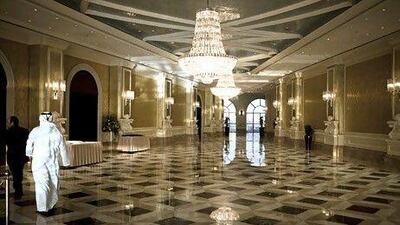Walking into the Ritz-Carlton Grand Canal in Abu Dhabi, visitors will leave behind a picture-perfect view of the Sheikh Zayed Grand Mosque as they wander to the waterfront opposite the Shangri-La and Bab Al Bahr hotels.
Opening before the end of the year, the major hotel development is extravagantly decorated with Venetian-style architecture, multiple chandeliers and a grand piano.
The name, the setting and furnishings are all as grand as Abu Dhabi's plans for its tourism industry, with the capital hoping to attract 7.9 million visitors per year by 2030, up from 2.1 million last year.
"We are working with the other hotels to make Grand Canal a destination in itself," said Pep Lozano, the general manager at the Ritz-Carlton. "It's good to have competition next to you because it increases the image of the city."
The tourism industry is set to be a major pillar of growth for the economy, with huge investment already undertaken on Yas Island and the ongoing cultural developments on Saadiyat Island.
The cluster of hotels around the Grand Canal is also one of the key areas of tourism for the city.
But competition is on course to remain high for the next couple of years in Abu Dhabi, with three hotels scheduled to open this year and occupancy levels predicted to fall as supply outstrips the number of tourists flowing into the country at present. The St Regis at Nation Towers and the Centro at the Capital Centre could both join the Ritz-Carlton in opening this year as Abu Dhabi pursues its goal of becoming a major hub for free-spending tourists.
The Ritz-Carlton will have 354 rooms and 85 villas as well as 10 restaurants and bars. On site, there will also be a huge Venetian Village area with cafes, restaurants and an Italian-style piazza. On the Corniche, the St Regis is also set to be a luxury development, with 283 rooms.
"Abu Dhabi is still a destination in the making and the destination marketing body is putting in place a strategy to attract a number of visitors through the different segments of the market," said Chiheb Ben Mahmoud, the head of hotel advisory for the Middle East and Africa at Jones Lang LaSalle Hotels.
The number of visitors to the capital has grown at a rapid rate, with 980,000 guests checking into hotels in the first five months of this year. That equates to double-digit growth on the same period last year.
About 6,700 additional rooms are expected to enter the market by the end of 2014 to reach about 21,400 rooms, translating to an annual growth rate of 13.3 per cent.
In the second quarter of this year, the only hotel to open in Abu Dhabi was the Eastern Mangroves resort, run by the Thai operator Anantara.
Occupancy levels fell by 6 per cent in the first half of the year, reaching 61 per cent, while the average daily rate dropped 9 per cent to Dh575 (US$156).
The Abu Dhabi Tourism and Culture Authority announced this year it would be selective in issuing hotel licences for new projects because of oversupply in the capital.
Despite this competitive environment for hoteliers, many are confident they will enjoy bustling trade during Eid, even as temperatures remain high.
Hilton Hotels said it was almost hitting capacity for Eid bookings across its hotels in the UAE, including Abu Dhabi.
Essam Abouda, the vice president for the Arabian Peninsula at Hilton, said supply was high in Abu Dhabi but it was only a matter of time before the tourism industry was booming.
"I'm very, very optimistic for Abu Dhabi," said Mr Abouda. "It will complement the UAE tourism industry by having different products. I believe 100 per cent demand is going to catch up."
Travel and tourism's contribution to the county's economy is expected to increase by 4.2 per cent a year to Dh132.4 billion, or 7 per cent of GDP, by 2022, according to the World Travel and Tourism Council.

